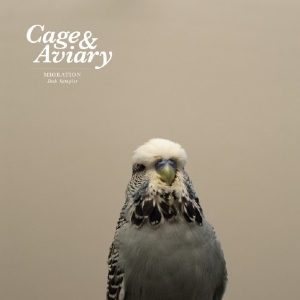An artist taking years to put out their first full-length album is nothing new. A record morphs from one thing to another as there’s often a huge disconnect between cultivating ideas and actual recording. It’s often a double-edged sword, as anticipation for the album might reach its fever pitch long before the actual release. As is the case with London duo Jamie Paton and Nigel of Bermondsey, aka Cage & Aviary.
Migration was an album I had been anticipating for years, actually, and by the time it finally came out, I had no idea it actually came out. After a string of singles on various labels and after the launch of their own label, Cage & Aviary were primed to make a huge splash in the dance rock genre. “Television Train” came out on DFA Records’ short-lived Death From Abroad label, with “Beat-N-Path” a year later on Mock & Toof’s Tiny Sticks imprint. Both were terrific and expansive singles that proved the band was more than a pet project for the two entrepreneurs.
“Television Train” has received a redesign for Migration, cutting the originally twelve minute track in half and turning it into a radio edit of sorts, tweaking the vocals and making the entire song a little more pop-oriented. For those new to the act, it will probably be the album’s highlight, as “Television Train” is immediately funky and fun, but for those looking for an entirely new Cage & Aviary, it’s a disappointment to see such an ambitious track scaled back quite a bit. The same can be said for what was once “Beat-N-Path,” now “Beat N Other Path” on the final album. The track is a bit more muddled and the crazy, pitch-deformed bass of the original is no longer focus on the album version. So the two tracks which have been redone for Migration are sort of hit and miss, but as for the rest of the album, it’s pretty spectacular work.
“Good Egg Bad Apple” takes on the same sort of tone as “Television Train,” playing with traditional disco beats and makes something that’s not entirely unlike Lindstrøm or Jaques Renault. The vocals are something like a vocal warmup mixed through a thousand different effects, making this demon-esque sort of noise that’s both out of place while remaining playful. Guitar chords chime in and out, keyboards and cow bells dance around and after nearly six minutes “Good Egg Bad Apple” comes together as one of the most mysteriously terrific tracks on the album. And I think this is a lot of what Cage & Aviary stand for, just playing around with different patterns and creating something that challenges the listener just enough, but also maintains a rhythm and style that’s never off putting. I know that’s the goal for a lot of artists, and often the outcome, but on Migration, Nigel and Paton really do put together interesting pieces of music that fit well into an album – a feat rarely achieved in this loosely defined genre. The entire project comes together on “Colourless Plastic,” a massive and psychedelic dance single. The song begins with no music, but rather a voice hurriedly saying “do we want to be colourless broken plastic figures joined together by elastic ropes and reasons to be sinful, yes we do.” In this one breath, Cage & Aviary have taken this idea of unidentifiable music and stated it outright, backing it with the music to match. Sure, the track’s backbone is a standard kick drum and shake that listeners will come to love on the album, but it’s Migration’s best track for all the patches of music that join the canvas. As the one line of dialogue repeats throughout, another voice joins in to whisper “to be sinful” repeatedly, backed by a massive guitar that sounds stripped from a Tame Impala or Ty Segall song. It’s a stark juxtaposition, but not the only one. There’s also a robot voice yelling the song’s title and a bridge of electronic drums that are nothing short of cheesy – a word I use in only the most complimentary of ways.
Migration is a fun journey, and at just over an hour it’s the perfect length for those looking for an expansive album or just a few terrific singles for their next dance party. Fans of prior singles have probably already taken note, but for those unfamiliar with the London duo, the album should not be missed. It’s progressive and enjoyable, a balance rarely mastered for dance acts, and one especially uncommon on debut albums, placing Nigel and Patton at the head of class for what is hopefully years to come.

